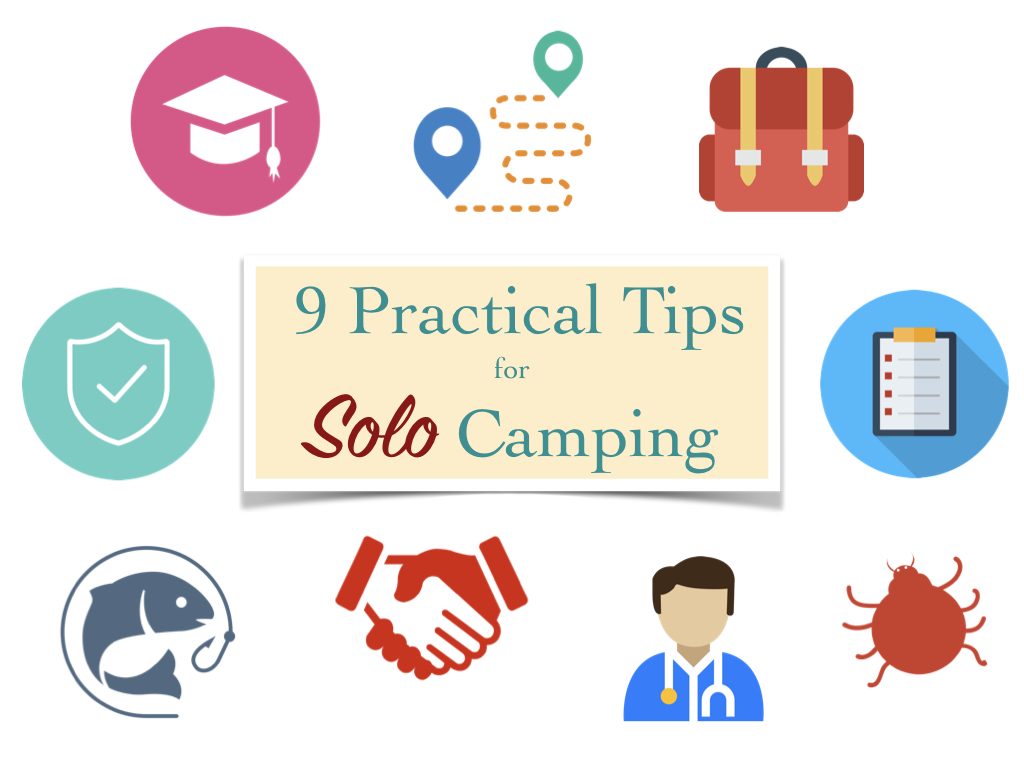Venturing alone into the backcountry can be a testing yet grounding experience. Many campers, including myself, find solace in solitude. That’s why we love solo camping so much!
We love the challenge and the rewards it brings. It’s an opportunity to push our limits and allows us to become more confident with ourselves.
So, before you decide to take the leap and try it for yourself (which you totally should!), check out these 9 practical tips for solo camping.


1. Build Up to Solo Camping
Just like with any hobby or sport, structured and gradual progression with plenty of practice can lead to mastery of the body and mind. Pitching tents, starting fires and managing a campsite are skills acquired over time, and can’t be rushed or perfected instantly.
So, before you hop into a wobbly canoe, paddle against a fierce head-wind, and portage 20 kilometers into the Algonquin backcountry all by yourself, acquire the proper skills and experiential foundation first.
Pro tip: Try a few new things with every camping opportunity. This ensures you have a firm understanding of basic principles, and let’s you build on your outdoors experience. If you pile on a tonne of non-mastered or novice camping skills, on top of camping solo, you risk creating a disastrous situation for yourself.

2. Plan a Realistic Itinerary
When planning a trip, distance, duration, terrain and weather along with personal experience level should dictate whether or not you should attempt a certain camping adventure.
It just makes sense – plan a realistic and attainable solo camping itinerary. Make sure it’s comfortable yet stimulating enough to ensure you’ll want to go again and again.
Pro tip: If it’s your first time solo camping, you should definitely be extra mindful of planning a camping trip well within your abilities. Remember, you (and only you) will be carrying all your gear, cutting all the firewood, and setting up your entire site among other camp activities. And everything takes more time and effort alone.

3. Keep Your Pack Light
No one likes carrying an overloaded pack. Not only is it uncomfortable and awkward, but there’s also a higher risk of injury. And a strained back in the backcountry (no pun intended) would be detrimental.
The weight of your gear and food may start to tip the scales when solo camping. If you can, opt for gear designed for single person use. There’s no need to bring a 4-person tent when it’s just you (and maybe your dog).
Also, when purchasing future camping items, ask yourself whether you would be able to use the same items for solo camping. This could lean your choice towards more light-weight and compact items.
Pro tip: Avoid and remove unnecessary packaging. Things like food packaging is notoriously excessive. Repackage items into zip-lock bags or smaller containers if possible.

4. Carry a Camping Gear Checklist
Checklists are incredibly handy for cataloging and maintaining your camping gear and food supply. You can quickly and easily see if you have certain items without having to rummage through your pack.
When packing and unpacking, it’s great to reference a checklist to ensure you haven’t forgetting something or even adding missing items you’d like to include for next time.
You can easily type out and save a standard camping checklist and then modify it for the type of camping you are doing.
Pro tip: Here’s a link to a helpful camping checklist we use for all of our trips!

5. Be Mindful of Flora and Fauna
Depending on where you end up solo camping, you may need to be extra mindful of certain species of plants and animals.
Contacting poison ivy, hogweed or wild parsnip can lead to anything from skin irritation to severe rashes. Likewise, running into venomous snakes, bears, cougars or moose on the trail can be a startling or even a serious encounter.
Research the plants and animals native to the area your will be visiting. Study the signs and symptoms of potential interactions and understand the steps required for prevention or treatment.
Pro tip: Carry noisemakers like bear bells to make your presence known to animals nearby, and bear spray for self-protection. If you bring a dog, keep them from wandering off into unfamiliar areas that might be hiding dangers.

6. Visit Your Doctor
Solo camping can be somewhat taxing on your body. Lifting, paddling, carrying and setting up camp takes more effort alone, so it’s good to make sure your body is in tip-top shape before heading out.
Let your doctor know of your plans and the level of intensity so he or she can properly assess your physical abilities.
The last thing you want to happen to you while in the woods is finding yourself clutching your chest, only to realize your health wasn’t up to snuff. So, unless you have a Wolverine mutation and are next to invincible, schedule a visit with a medical expert. It’ll give you (and your family) extra piece of mind.
Pro tip: A general physical is good at determining if you are in acceptable physical condition. To be extra sure, ask for blood work to be done to make sure there isn’t anything lurking in your system before heading out.

7. Share Your Plan with Someone
For some solo campers, venturing into the backcountry is an attempt to remove themselves from the hustle and bustle of normal life. However, for your safety, it is imperative that you notify someone of your plans before heading out.
Likewise, when you return, contact the same people to let them know you are safe and sound. Although this is critical for solo camping, it’s also applicable to any and all travel. So, whether it’s an all-inclusive trip to the Bahamas, or a hiking trek through Banff National Park, let someone know your plans.
Pro tip: Before leaving, I always share my itinerary with my significant other and our parents. I outline the dates and times I plan on leaving and returning. I share emergency contact numbers, including the campground or park ranger number, as well as any other important details.

8. Bring Something to Settle Your Mind
We’ve all been there. You arrive at your campsite, set up all your gear, start to explore your surroundings, eat, drink, clean up. Now what?
Well, having something to keep your mind occupied can be fairly important in order to enjoy solo camping. Don’t get me wrong, having time to reflect and think clearly is wonderful, and is the primary reason I often choose to solo camp. But, then again, my mind tends to wander off a lot.
So, if you’re like me, to keep yourself grounded, bring something to read or plan for an activity while you’re camping. Personally, I always bring my fishing rod. I love the clarity and calm fishing brings to me. Casting, reeling, casting again. And, when something bites, the sudden rush of excitement. To me, it’s bliss.
I also bring a journal to track any thoughts and a really engaging book (the Harry Potter series is a personal favourite). For some reason, these things gets my creative juices flowing and I feel extra fulfilled when I return home.
Other fun things you can do to keep your mind occupied is to practice whittling (check out my article about the Best Camping Knives), target practice with a slingshot (this one from Amazon is great and inexpensive), or sketch landscapes (all you need is paper and a pencil!)

9. Create an Emergency Plan
Too often, campers venture into the backcountry inadequately prepared, with limited supplies, or become injured and find themselves up crapshoot creek. Conversely, survivors of harsh weather or physical injury were able to make it to safety because they recognized the risks prior to leaving and planned for the worst.
So, before you set foot in the wilderness, make sure you create and establish an emergency plan. Try answering the following questions:
- Are there any inherent dangers with the location I’m visiting?
- Am I prepared to handle inclement weather?
- How would I contact emergency personnel?
- Do I have the necessary equipment in case of an emergency?
Your answers might have have been revealing – you’re either prepared of unprepared to deal with an emergency.
When developing an emergency plan for any camping trip, map out your exit strategy to determine how you will physically evacuate. Find and note EMS and park ranger contact numbers. In remote areas, 9-1-1 may not work! Check cellular coverage with your carrier and try to stay well within the boundaries. Carry a fully charged cell phone and make sure you don’t drain the battery. Better yet, bring a battery bank so that you can charge your device if depleted. If there is no cellular reception, carry a two-way radio and find out the emergency channels. And, to be extra safe solo camping, consider carrying a personal S.O.S. device that, once activated, broadcasts your exact position to rescue teams.
As the saying goes, hope for the best, but plan for the worst. You’ll be glad you did!
Solo camping is a huge milestone for outdoor enthusiasts. It takes a lot of mental fortitude and pushes your skills further.
I hope you’ve found these tips useful for planning your next solo camping adventure. Where are you planning to solo camp? What other things should campers be mindful of before heading out? Leave your thoughts in the comments below!
This article contains affiliate links, which help support this blog at no cost to you!
